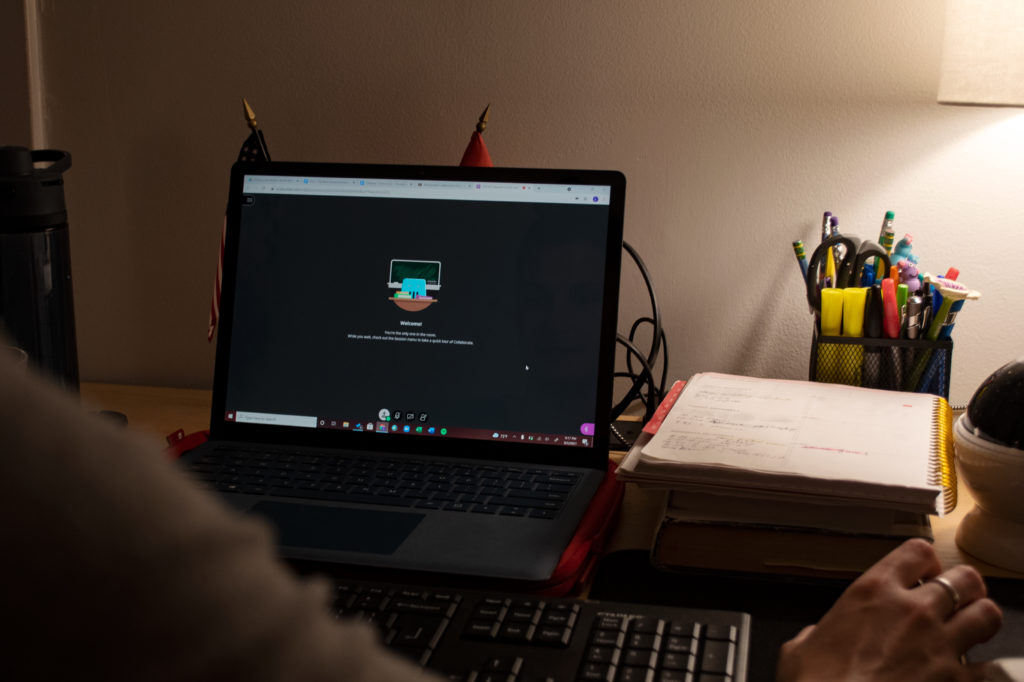After nearly three semesters of online instruction, the student body has returned to classrooms, but some professors have not.
A few dozen professors will teach 45 on-campus courses through remote instruction this fall, according to the Schedule of Classes, because they live outside of the DMV or have personal health concerns that prevent them from teaching in person amid the COVID-19 pandemic, officials said. Faculty teaching remotely this semester said they remain excited to teach classes remotely and will work to create the best experience they can for their students through check-ins and flexible office hours.
University spokesperson Crystal Nosal said deans of each school determined which programs and classes could be taught online, and professors were not “empowered” to independently decide between remote and in-person instruction. Nosal said some professors with remote courses this fall have an Equal Employment Opportunity designation, which exempts faculty from teaching class in-person due to health or “personal” reasons.
Classes that have been traditionally held online will continue operating virtually, like many off-campus and online programs, according to the Schedule of Classes.
“GW has many programs, particularly at the graduate level, that are traditionally taught online,” she said. “These programs will continue to be taught online. Some graduate programs have increased their online offerings.”
Nosal declined to say how many classes will be taught remotely this fall or how faculty notified their students that classes would be virtual. She also declined to say whether students will be required to attend in person for remote classes and whether professors can switch to remote learning during the semester.
Despite GW’s policy, some faculty teaching remotely this semester said their classes are virtual this semester mainly because they live far away from the District and campus. In interviews, some remote faculty said they began at GW shortly before the semester began, and many students still need to attend classrooms in person even if the professor is remote.
Mary Beth Janke, a professor of psychology who is teaching a course titled Psychology of Crime and Violence remotely this fall, said the University approved her course’s remote instruction because she lives outside of the District. She said she left GW when in-person instruction was to resume this fall, but the University rehired her and allowed her to teach remotely this semester because they have not hired her replacement yet.
“I’m sure there are other people that got exemptions for other reasons than mine – medical or religious – since they made vaccines mandatory,” she said. “But I’m thrilled, I’m honored as well because it’s a great class, and it’s very popular at GW.”
Janke said she teaches her class on Zoom and has received positive feedback from students after her first two sessions last week. She said some students enjoyed the remote option because returning to in-person instruction fully was “overwhelming” after multiple semesters of virtual learning.
“I have no freshmen in my class so I would say that having mostly juniors and seniors, they’re very used to Zoom and there’s pros and cons,” she said. “I think for the most part so far, everybody’s back in D.C., at least not in their homes or wherever they were living for the past year and a half.”
John Gee, a professor of American studies who is teaching History and Meaning of Higher Education in the United States remotely this fall, said he will instruct online because the professor who was initially supposed to teach the course became unavailable over the summer. He said officials hired him to teach the course this summer before the semester started.
He said the class is his first at GW and his first time teaching an online class and added that he will instruct the course over Zoom from his home in Boston.
“One of the things about an online course is it can be difficult to get a sense of how everything’s going just in the classroom, like you can face-to-face,” he said. “So I will be sure to reach out to students and do surveys and things like that as the course goes along.”
Kate McKown, a freshman studying biology, said her professor for her Introduction to Public Health and Health Services class notified her and her classmates a few days before the start of the semester that his class would be remote.
McKown said students have to attend the class in person with a teaching assistant who moderates the students in the classroom while the professor is instructing over Zoom.
“I understood that there are so many extenuating circumstances,” she said. “I’m sure that some professors need to be online for health and safety, so a mixed bag. Overall, I think two classes in, I think it’s going well so far.”
McKown’s remote class had not been designated as remote instruction, according to the Schedule of Classes, but The Hatchet obtained an email from the professor saying the Milken Institute School of Public Health has decided the class can meet over Zoom entirely.
Maddie Billet, a sophomore studying political science and environmental studies, said her Women’s Health class is remote this semester, which she learned through the syllabus only a few days before classes began. She said she was “low-key mad” at first after finding out her class was remote because her professor did not provide a reason for teaching from home.
She said she can attend the class via Zoom in a designated classroom if she wants with the teaching assistant projecting the professor and his lecture on TV screens. The class is not listed as remote instruction according to the Schedule of Classes as of Monday.
She said she considered dropping the class after learning it was remote but decided to stay for now because she likes the course’s content.
“I like the content that we’re being taught,” she said. “It’s just awkward. In comparison to my other classes, it’s definitely not the same energy.”








